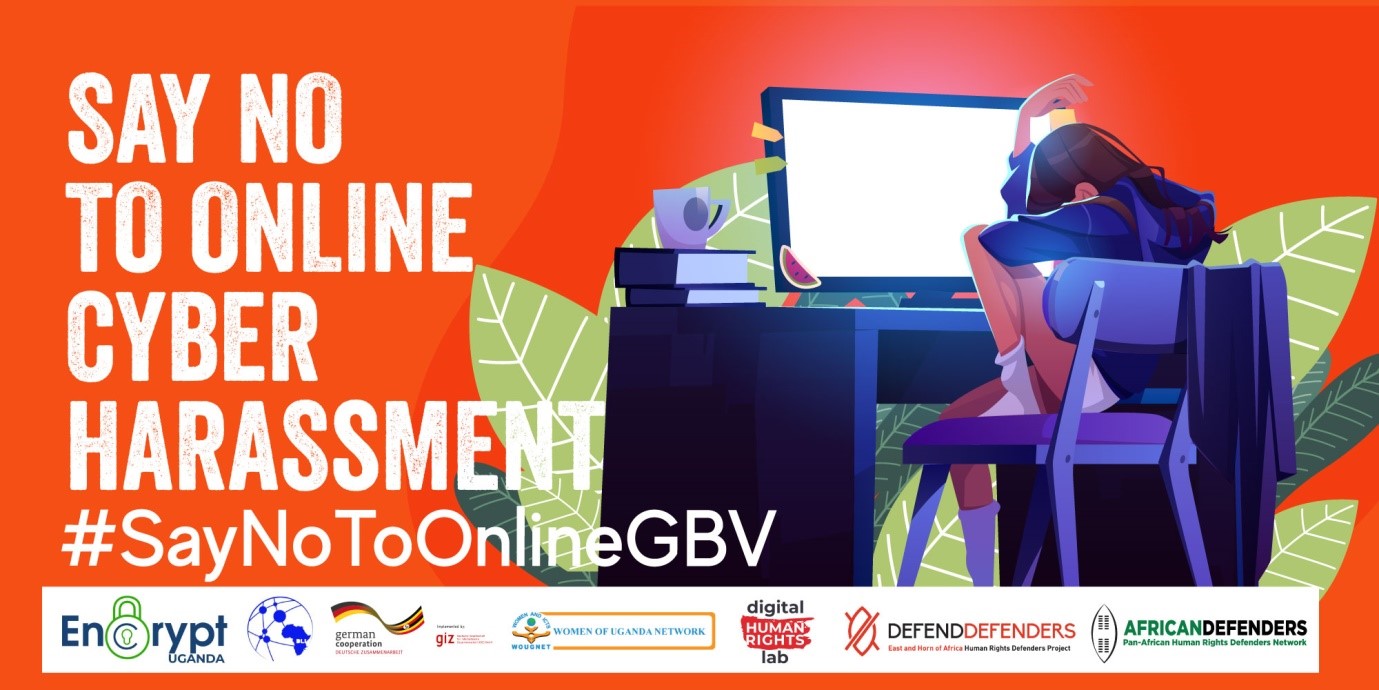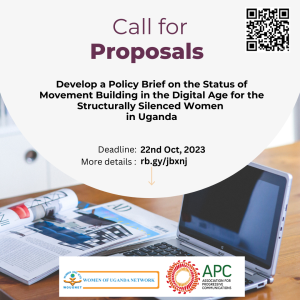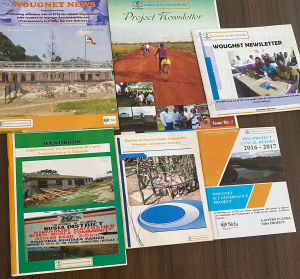Background
In 2013, Lindsey Kukunda the Founder of Her Empire (Not Your Body), a feminist organization in Uganda called out a popular bar in Kampala, for being racist on social media. She received mixed reactions from the public for having stood up against the bar’s racist culture. However, on one occasion while she was hanging out with friends, a random person, without her consent took a picture of her and posted it on social media. In his caption, he stated that “Can you imagine this chic without boobs (breasts) is the one who called out the bar?” This is only one of the many instances or stories you would get to know from the public if you conducted a survey about victim/survivor’s experiences with body shaming.
Just like the remarks made about Lindsey Kukunda, any practice or act that tends to humiliate a person or people by making sexist statements basing on their physical appearances like body size, shape or weight amounts to body shaming. Most women online are always bombarded by a culture of misogyny that often includes offensive and sexualized remarks or comments. It is a common sight for various people or societies in Uganda to fantasize about people especially women who are “slim” in terms of size while they demonize or dehumanize those that seem to be “overweight”. This is because most of the societies we live in are hinged on patriarchal settings where women’s bodies are often sexualized or viewed as sexual objects hence the “need” for them to maintain “slim” bodies that most men tend to find sexually attractive.
A survey conducted by the World Wide Web Foundation in February 2020 indicated that 52% of the female respondents have faced online Gender-Based Violence as compared to the men who stood at 50%. The same survey shows that 17% of the female respondents were emotionally and psychologically affected by online gender-based violence as compared to 13% for the males. Additionally, research carried out by Bullying Statistics, an organization founded to provide Anti-Bullying Help and data show that 94% of teenage girls and 65% of teenage boys have been body shamed before. These comparisons clearly indicate that more women than men have faced or are likely to be body-shamed as compared to men. However, it is important to note that body shaming has always existed although the increase or surge in the use of the internet especially on the social media platforms due to the COVID-19 disease outbreak has only made the situation worse and this has come into attention. The International Telecommunications Union (ITU) reports that the proportion of women using the internet is 12% lower than the proportion of men. This only points to the fact that furthering online abuse through body shaming will widen the already existing gender divide in terms of internet usage hence violating women’s constitutional right of access to information, freedom of speech, expression, press, privacy, and data protection.
Why Online Body Shaming Cases are on the Rise?
The furtherance or growth in the number of body shaming in Uganda is partly attributed to the fact that the government or its enforcement agencies have not made very significant efforts towards eliminating body shaming as a form of violence against women. Cases of body shaming or any other forms of online Gender-Based Violence are rarely investigated and prosecuted yet the Uganda Police Force has the Cyber Crimes Unit that is mandated to investigate such matters. Instead, victims of online harassment have on several occasions been arrested and charged under laws that seem to target the victims of abuse but not the perpetrators as seen when Police summoned and ordered for the arrest of Martha Kemigisha Kagimba alias Martha Kay, a popular Ugandan comedian, and actress after her sexually explicit pictures and videos were leaked anonymously online. A survey conducted by Women of Uganda Network (WOUGNET) shows that 74% of the respondents prefer to report cases about online violence against women to the Police. However, trust in the Police Force and Justice System could fade away if they continue to apprehend victims instead of perpetrators of such abuse. Due to this common practice by the Uganda Police Force, Lindsey in an interview with WOUGNET on December 2nd, 2020 argued that the government is actually the biggest perpetrator.
Additionally, Religion and Education have equally played a big role in the increase in cases of online violence against women. Most religions if not all preach and uphold the subordination of women to men instead of equality between the two genders. A quick example is 1Timothy 2:11-12 which states that “Let a woman learn quietly with all submissiveness. I do not permit a woman to teach or to exercise authority over a man; rather, she is to remain quiet.” This clearly Justified Lindsey’s opinion when she said that Religion is not a safe space for women during her interview with WOUGNET. Similarly, our Education system has equally been put on the spot for failing to check academic institutions that sexually objectify their students’ dress code especially that of women by advancing the argument that dressing “indecently” lures men into sexually harassing women both physically and online. We contend that when children are raised under such principles that sexually objectify women’s bodies, there will be a surge in the number of body shaming amongst especially against women as a form of online harassment.
What are the Possible Impacts of Online Body Shaming?
Research has shown that body shaming has both physical and mental impacts upon victims and survivors like anorexia, clinical depression, anxiety, low self-esteem, eating disorders, and mental distress hence the need to address it urgently. The World Wide Web’s survey, indicates that 17% of the female and 13% of the male respondents faced emotional or physical effects of online abuse. Therefore, more women than men are at a risk of facing the physical and emotional side effects of body shaming like anorexia, anxiety, and depression. These side effects in some cases may even prompt victims of body shaming into acts and thoughts of self-harm or suicidal tendencies hence the need to effectively address this issue. It is upon this basis that WOUGNET in partnership with Encrypt Uganda, DefendDefenders, African Defenders, Digital Literacy Initiative, and Digital Human Rights Lab is conducting the #SayNoToOnlineGBV campaign as the world commemorates the #16DaysOfActivism this year, 2020. The purpose of this campaign is to highlight the various issues on online violence against women especially during the COVID-19 Pandemic and provide a platform for victims/survivors of online abuse like body shaming to share their stories and experiences. A clear example is Elena’s story who on several occasions had to skip school because her classmates often referred to her as an “Elephant” due to the size of her legs. In fact, this very insult was repeated by one of her former classmates sometime later on Facebook which brought back the traumatizing memories of her childhood experience with body shaming. This therefore campaign enabled the victims and survivors to speak up about online violence against women.
How Can We Tackle Body Shaming?
Uganda has laws like the Computer Misuse Act of 2011 under Section 24 which expressly prohibits any form of cyber harassment including any act or statement of an indecent nature using electronic communication devices. Additionally, Section 25 of the same Act provides for the crime of offensive communication and thereunder criminalizes all willful and repeated acts or statements made through the use of electronic communication devices that tend to disturb or attempt to disturb the peace, quietness or right of privacy of any person with no purpose of legitimate communication. This clearly shows that Uganda’s legal framework in regards to body-shaming is not lacking but rather its enforcement through the Cyber Crimes Unit of the Uganda Police Force. Therefore, the Cyber Crimes Unit, Office of the Director of Public Prosecution (ODPP) and the Judiciary should expedite the investigation and dispensation of justice in cases of online harassment such as those that involve body shaming. Similarly, Lindsey Kukunda suggests civil society organizations should work with the government especially Parliament to eradicate all laws that sexualize bodies and target victims of online abuse like the Anti-Pornography Act of 2014.
As Women of Uganda Network (WOUGNET), it is our position that victims and survivors of online body-shaming ought to take the necessary steps to report such indecent posts to the social media platforms on which they are posted and these platforms, on the other hand, are mandated to investigate, take down such posts and suspend accounts found in violation of internet safety rules and regulations.
WOUGNET whose mandate is to advocate for women’s rights online propose that both the state and non-state actors should invest in the accessibility and availability of Mental Health and Psychosocial Support (M.H.P.S.) to victims and survivors of body shaming as a means of restoration to victims/survivors and mitigation of its possible side effects like suicidal tendencies.
Conclusion
The right of access to the internet is a paramount and fundamental human right that every individual in society is entitled to and should be enjoyed by all, irrespective of gender, race, religion, geographical location. However, if efforts are not made towards ending online Gender-Based Violence like body shaming, this right will only remain in our law books but shall not be enjoyed by vulnerable groups such as women who are also governed by the laws and often left out (excluded).
Written by Iribagiza David
Communications Intern.






